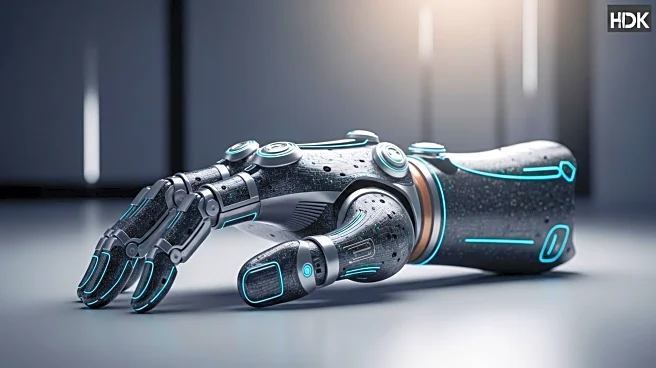What is the story about?
What's Happening?
A recent study published in Nature Scientific Reports highlights the significant socioeconomic benefits of investing in advanced prosthetic hands for amputees. The research, which utilized real-world data, found that every dollar spent on these high-tech prostheses generates approximately nine dollars in socioeconomic benefits. This includes improvements in amputees' health and financial independence. The study employed a Social Return on Investment (SROI) framework, which expands traditional ROI accounting by considering both direct monetary values and indirect benefits such as caregiver stress reduction and community integration. The study involved 11 upper-limb amputees using the Hannes hand, an advanced robotic device developed in Italy, and demonstrated an aggregate socioeconomic benefit of nearly half a million euros in the first year, more than triple the cost of the units.
Why It's Important?
The findings of this study underscore the potential for advanced prosthetic technology to deliver substantial economic and social benefits. By enhancing the functional capabilities and psychosocial well-being of amputees, these devices can reduce public health spending and increase individual earning capacity. The reduction in caregiving needs also alleviates economic opportunity costs associated with unpaid care, allowing caregivers to re-enter the workforce. This contributes to overall economic productivity and supports labor market participation for amputees, reducing dependence on social welfare systems. The study aligns with value-based healthcare models that prioritize outcomes over costs, suggesting that investments in advanced prosthetics can foster economic stability and societal gains.
What's Next?
While the study's sample size was limited to 11 individuals, the promising results suggest that larger-scale research could further validate the high SROI of advanced prosthetic hands. If confirmed, these findings could influence policy decisions regarding healthcare coverage and funding for prosthetic technology. Stakeholders such as healthcare providers, insurers, and policymakers may consider expanding access to these devices, recognizing their potential to deliver long-term savings and societal benefits. Future studies could explore the impact of advanced prosthetics on different demographics and settings, potentially leading to broader adoption and integration into healthcare systems.
Beyond the Headlines
The study's implications extend beyond immediate economic benefits, highlighting ethical considerations in healthcare access and technology adoption. By demonstrating the value of advanced prosthetics, the research challenges insurers' reluctance to cover these devices, often deemed 'not medically necessary.' It advocates for a shift in perspective, emphasizing the broader societal gains of investing in amputees' health and independence. This could prompt discussions on healthcare equity and the role of technology in enhancing quality of life for individuals with disabilities.















